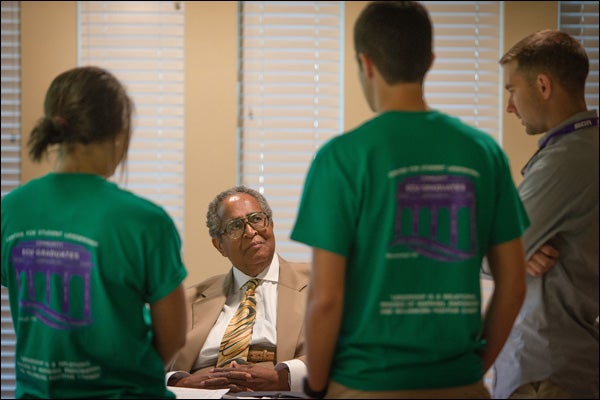FIGHTING INJUSTICE
Franklin McCain, who led Greensboro sit-ins, challenges ECU students to get involved

Franklin E. McCain, one of the original four who took part in the Woolworth sit-in in Greensboro in 1960, speaks with students (l to r) Grace Brown, Zackery Hawkins and Ira Rushing before he addressed students and faculty at East Carolina University on Sept. 14. (Photo by Jay Clark)
Dr. Franklin McCain, one of four men who led the Greensboro Woolworth’s sit-ins for civil rights in 1960, challenged East Carolina University students on Sept. 14 to find ways to leave the Earth better than they found it.
“It’s your life. You’re in control,” McCain said. “You should be ashamed if you don’t contribute something.”
McCain was the featured speaker for Lead Week, sponsored by the Center for Student Leadership and Engagement, which spotlighted service in recognition of ECU as a leadership university. “We hope Lead Week will become a week of awareness for many things,” said Ira Lawson, 23, of Timberlake, a second-year graduate student in communications.
McCain took students back to the months leading up to the Feb. 1 sit-in and the weeks after the historic movement against segregation, which forced blacks to use separate bathrooms and water fountains or denied participation in many activities.
“I appreciate how passionate he is and how he tells his story so easily,” said Marcella Camara, 20, of Durham, a junior community health and nursing major. “For him to say that he never saw failure as an option is really inspiring.”
In 1960, McCain was a 17-year-old freshman at North Carolina A&T State University who had become fed up with the injustices he saw. He did all the things his parents and grandparents told him to have a successful life: follow the Ten Commandments, attend Sunday school, get superior grades, respect elders, and never expect to be acknowledged or paid for his work. Despite his efforts, he was denied rights because he was black. “There is no other reason,” he said. “I felt betrayed.”
After leaving Union County for college, he found friends who felt the same way. McCain and roommate Joseph McNeill lived near David Richmond and Ezell Blair Jr. at N.C. A&T.
The four students decided to demonstrate their dissatisfaction in a non-violent and Christian way based on the influences of Jesus and Gandhi. They chose Woolworth’s where they could buy any items they wanted, but couldn’t sit down, eat and pay for a meal at the lunch counter.
It was about a one-mile walk from campus, and McCain said he was prepared to go to jail or die to gain his freedom, dignity and manhood. “Fifteen seconds after I sat on that stool, I felt free,” he said. “I would not have felt cheated if I had died that very moment. There was complete peace, acceptance, invincibility.”
One of the greatest lessons McCain learned came from an elderly white woman sitting a few stools down. He thought her fixed gaze meant disapproval. “That lady put her hands on our shoulders and said ‘I’m proud of you,’” McCain said. “Don’t stereotype anybody in your life. Get to know people before you conclude what they are. You not only owe it to them, but you owe it to yourself.”
A police officer came, but no one was arrested, and the store closed early. They decided to go back the next day, and asked people on campus to join them. But it took a while for A&T students to get involved. The first to help were three white students from Women’s College, now the University of North Carolina at Greensboro, whom administrators threatened to expel if they returned to the sit-in.
The movement spread to High Point and Winston-Salem, and about 70 other cities after the first week. As the weeks progressed, 67 students worked in shifts, occupying every stool, at the Greensboro store alone, McCain said.
They were spat on, their clothes were cut with razor blades, and they were called names, but they persevered. “Nothing was going to stop us because we had a clear vision,” McCain said. “Leadership is actually learned and, for it to be effective, it has to be shared.”
He encouraged students to work for things they feel strongly about.
“If there is something you feel compelled to do, don’t wait for the masses,” McCain said. “Get out of the conspiracy of silence when you see things that are not right.”
He finally ate a sandwich at that lunch counter on July 26, once the store desegregated after six months of lost revenue from the sit-ins. McCain received a bachelor’s degree in chemistry and biology in 1964 from N.C. A&T.